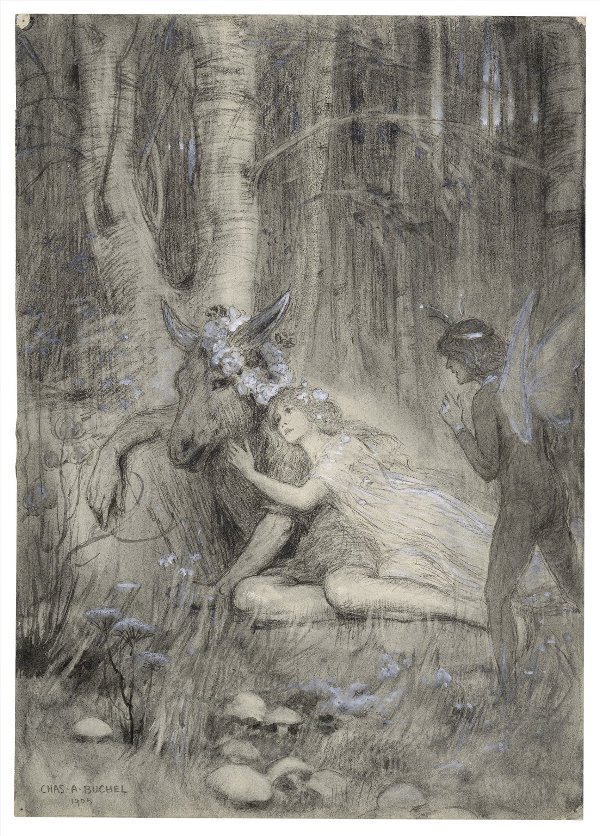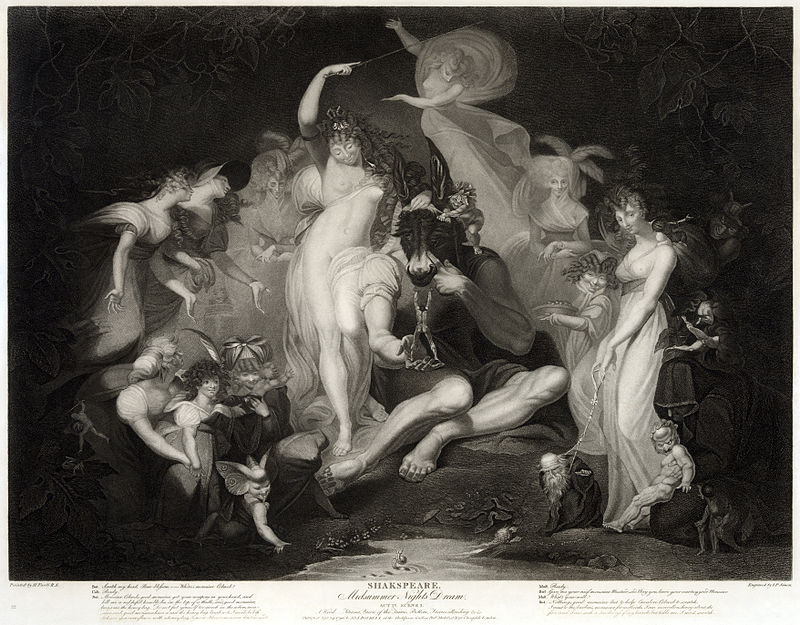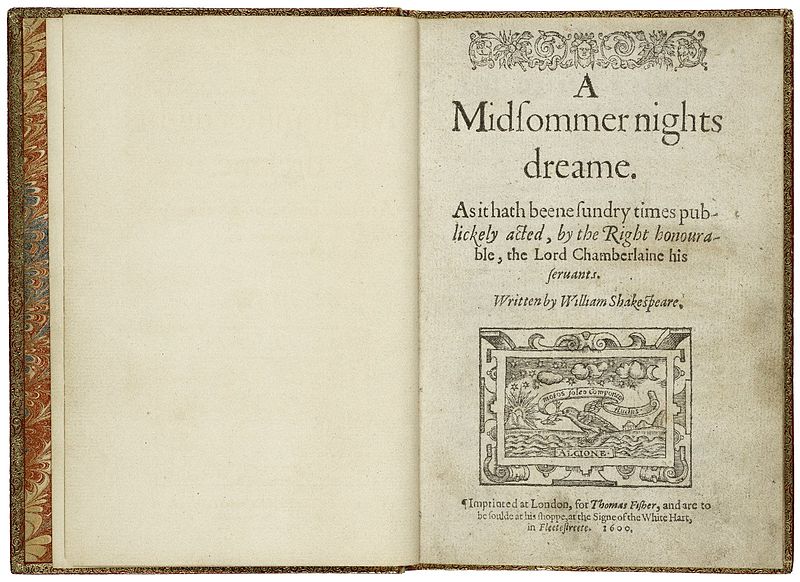
A
Midsummer Nights Dream
by William Shakespeare

A Midsummer
Night's Dream is a comedy play by
William Shakespeare, believed to
have been written between 1590 and
1597. It portrays the events
surrounding the marriage of the Duke
of Athens, Theseus, and Hippolyta.
These include the adventures of four
young Athenian lovers and a group of
six amateur actors (mechanicals),
who are controlled and manipulated
by the fairies who inhabit the
forest in which most of the play is
set. The play is one of
Shakespeare's most popular works for
the stage and is widely performed
across the world.
 Hermia
and Helena by Washington
Allston, 1818
Hermia
and Helena by Washington
Allston, 1818
The
Play consists of four
interconnecting plots,
connected by a celebration of
the wedding of Duke Theseus of
Athens and the Amazon queen,
Hippolyta, which is set
simultaneously in the woodland
and in the realm of Fairyland,
under the light of the moon.
The play opens with
Hermia, who is in love with
Lysander, not wanting to
submit to her father Egeus'
demand that she wed Demetrius,
whom he has arranged for her
to marry. Helena meanwhile
pines unrequitedly for
Demetrius. Enraged, Egeus
invokes an ancient Athenian
law before Duke Theseus,
whereby a daughter must marry
the suitor chosen by her
father, or else face death.
Theseus offers her another
choice: lifelong chastity
while worshiping the goddess
Diana as a nun.
Peter Quince and his
fellow players plan to put on
a play for the wedding of the
Duke and the Queen, "the most
lamentable comedy and most
cruel death of Pyramus and
Thisbe". Quince reads the
names of characters and
bestows them to the players.
Nick Bottom, who is playing
the main role of Pyramus, is
over-enthusiastic and wants to
dominate others by suggesting
himself for the characters of
Thisbe, the Lion, and Pyramus
at the same time. He would
also rather be a tyrant and
recites some lines of Ercles.
Quince ends the meeting with
"at the Duke's oak we meet".
In a parallel plot line,
Oberon, king of the fairies,
and Titania, his queen, have
come to the forest outside
Athens. Titania tells Oberon
that she plans to stay there
until she has attended Theseus
and Hippolyta's wedding.
Oberon and Titania are
estranged because Titania
refuses to give her Indian
changeling to Oberon for use
as his "knight" or "henchman,"
since the child's mother was
one of Titania's worshipers.
Oberon seeks to punish
Titania's disobedience. He
calls upon Robin "Puck"
Goodfellow, his "shrewd and
knavish sprite", to help him
concoct a magical juice
derived from a flower called
"love-in-idleness", which
turns from white to purple
when struck by Cupid's arrow.
When the concoction is applied
to the eyelids of a sleeping
person, that person, upon
waking, falls in love with the
first living thing they
perceive. He instructs Puck to
retrieve the flower with the
hope that he might make
Titania fall in love with an
animal of the forest and
thereby shame her into giving
up the little Indian boy. He
says, "And ere I take this
charm from off her sight, / As
I can take it with another
herb, / I'll make her render
up her page to me."
Hermia and Lysander have
escaped to the same forest in
hopes of eloping. Helena,
desperate to reclaim
Demetrius's love, tells
Demetrius about the plan and
he follows them in hopes of
killing Lysander. Helena
continually makes advances
towards Demetrius, promising
to love him more than Hermia.
However, he rebuffs her with
cruel insults against her.
Observing this, Oberon orders
Puck to spread some of the
magical juice from the flower
on the eyelids of the young
Athenian man. Instead, Puck
mistakes Lysander for
Demetrius, not having actually
seen either before, and
administers the juice to the
sleeping Lysander. Helena,
coming across him, wakes him
while attempting to determine
whether he is dead or asleep.
Upon this happening, Lysander
immediately falls in love with
Helena. Oberon sees Demetrius
still following Hermia and is
enraged. When Demetrius
decides to go to sleep, Oberon
sends Puck to get Helena while
he charms Demetrius' eyes.
Upon waking up, he sees
Helena. Now, both men are in
pursuit of Helena. However,
she is convinced that her two
suitors are mocking her, as
neither loved her originally.
Hermia is at a loss to see why
her lover has abandoned her,
and accuses Helena of stealing
Lysander away from her. The
four quarrel with each other
until Lysander and Demetrius
become so enraged that they
seek a place to duel each
other to prove whose love for
Helena is the greatest. Oberon
orders Puck to keep Lysander
and Demetrius from catching up
with one another and to remove
the charm from Lysander.
Lysander returns to loving
Hermia, while Demetrius
continues to love Helena.
 A
drawing of Puck, Titania
and Bottom from Act III,
Scene ii.
A
drawing of Puck, Titania
and Bottom from Act III,
Scene ii.
Meanwhile,
Quince and his band of six
labourers ("rude mechanicals",
as they are described by Puck)
have arranged to perform their
play about Pyramus and Thisbe
for Theseus' wedding and
venture into the forest, near
Titania's bower, for their
rehearsal. Bottom is spotted
by Puck, who (taking his name
to be another word for a
jackass) transforms his head
into that of a donkey. When
Bottom returns for his next
lines, the other workmen run
screaming in terror, much to
Bottom's confusion, since he
hasn't felt a thing during the
transformation. Determined to
wait for his friends, he
begins to sing to himself.
Titania is awakened by
Bottom's singing and
immediately falls in love with
him. She lavishes him with
attention and presumably makes
love to him. While she is in
this state of devotion, Oberon
takes the changeling. Having
achieved his goals, Oberon
releases Titania, orders Puck
to remove the donkey's head
from Bottom, and arranges
everything so that Hermia,
Lysander, Demetrius, and
Helena will believe that they
have been dreaming when they
awaken.
The fairies then
disappear, and Theseus and
Hippolyta arrive on the scene,
during an early morning hunt.
They wake the lovers and,
since Demetrius does not love
Hermia any more, Theseus
overrules Egeus's demands and
arranges a group wedding. The
lovers decide that the night's
events must have been a dream.
After they all exit, Bottom
awakes, and he too decides
that he must have experienced
a dream "past the wit of man".
In Athens, Theseus, Hippolyta
and the lovers watch the six
workmen perform Pyramus and
Thisbe. Given a lack of
preparation, the performers
are so terrible playing their
roles to the point where the
guests laugh as if it were
meant to be a comedy, and
everyone retires to bed.
Afterwards, Oberon, Titania,
Puck, and other fairies enter,
and bless the house and its
occupants with good fortune.
After all other characters
leave, Puck "restores amends"
and suggests to the audience
that what they just
experienced might be nothing
but a dream (hence the name of
the play).

A
Midsummer Night's Dream
act IV, scene I. Engraving
from a painting by Henry
Fuseli
Published 1796 - (click
image for large size)
 The title page from the
first quarto, printed in
1600
The title page from the
first quarto, printed in
1600
- (click
image for large size)
The play
was entered into the
Register of the Stationers
Company on 8 October 1600 by
the bookseller Thomas
Fisher, who published the
first quarto edition later
that year. A second quarto
was printed in 1619 by
William Jaggard, as part of
his so-called False Folio.
The play next appeared in
print in the First Folio of
1623. The title page of Q1
states that the play was
"sundry times publickely
acted" prior to 1600. The
first performance known with
certainty occurred at Court
on 1 January 1605.
Source: Wikipedia
|
|

